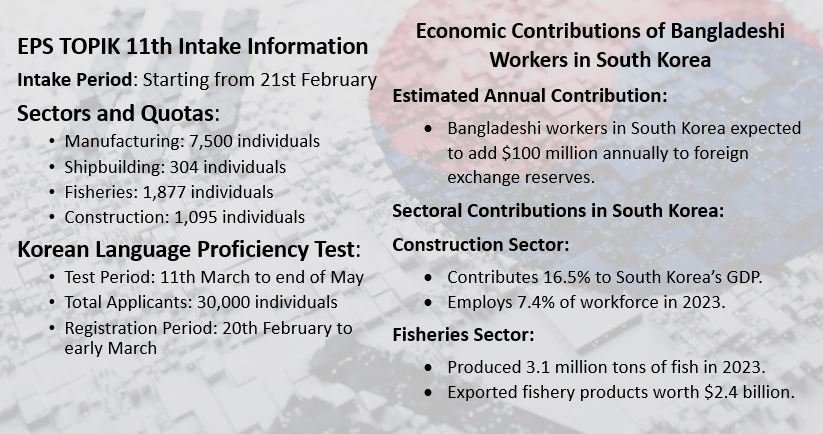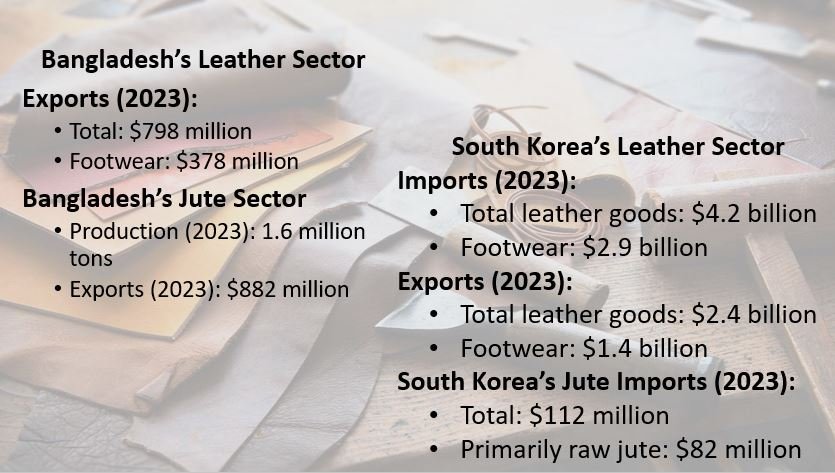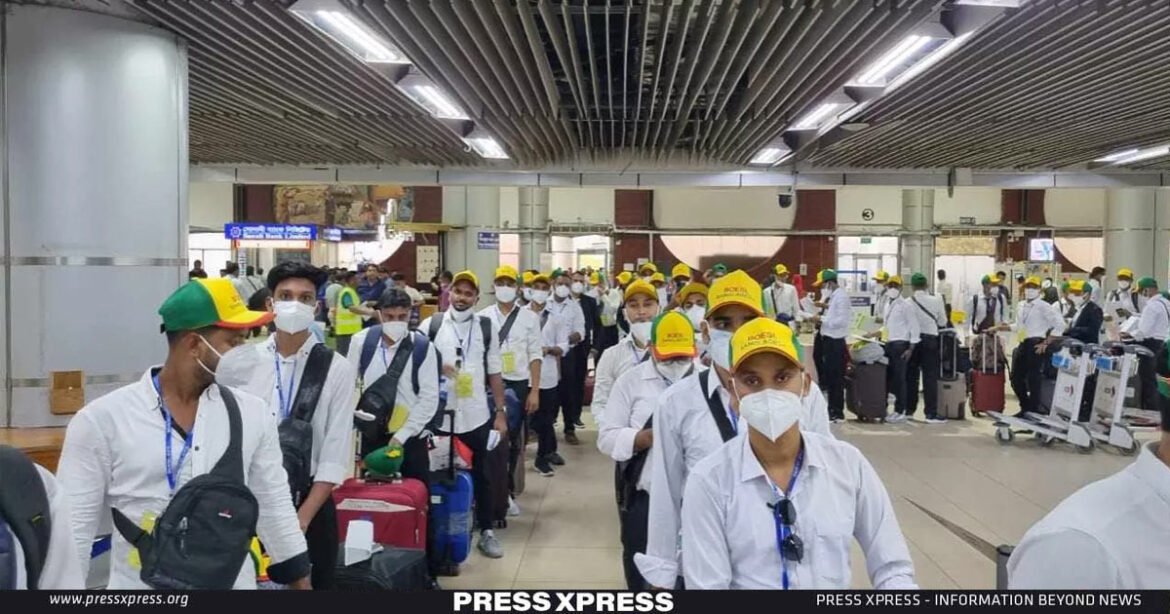Key highlights:
- South Korea, a key economic partner of Bangladesh, announced job openings in construction and fisheries for Bangladeshi workers, as revealed by Korean Ambassador Park Young-sik on February 20th.
- In 2024, Korea plans to recruit 7,500 in manufacturing, 304 in shipbuilding, 1,877 in fisheries, and 1,095 in construction sectors.
- Workers sent to South Korea in 2024 are expected to generate an additional $100 million annually based on the South Korean minimum wage of KRW 2,060,000 per person.
- Bangladesh, the second-largest leather footwear exporter in Asia and seventh globally, exported $798 million worth of leather and leather products in 2023, with $378 million from footwear alone.
South Korea, one of Bangladesh’s leading economic partners, announced the opening of job opportunities in the construction and fisheries sectors for Bangladeshi workers, as revealed by the Korean Ambassador to Bangladesh, Park Young-sik, on Tuesday, February 20th.
By every means, Korea is an attractive workplace for our country’s people. Korea is a country surrounded by the sea, with a long history and tradition of fishing and shipbuilding. The Korean fisheries and construction sector is one of the pillars of its ocean economy, contributing to food security, employment, trade, and innovation. In recent years, Korea has opened up new opportunities for its fisheries and construction sector by expanding its overseas markets, developing advanced technologies, and enhancing its sustainability.
Korean Ambassador said, fishing and construction have been added to the existing manufacturing and shipbuilding industries, which have been hiring Bangladeshi workers since 2008 under the Employment Permit System-Test of Proficiency in Korean (EPS TOPIK) program.
The EPS is a system for hiring non-specialized overseas workers from 16 countries, including Bangladesh, to enter Korea only after they have been evaluated for suitability through Korean language tests and skill level assessments. Recently, Tajikistan was confirmed as the 17th sending country.
How to apply for the 11th EPS TOPIK?
The Bureau of Manpower, Employment, and Training (BMET) will commence the intake of applications for the 11th (EPS TOPIK) for prospective workers aiming for employment in South Korea, on a first-come, first-served basis, starting from 21st February.
In 2024, Korea is set to enlist 7,500 individuals in manufacturing, 304 in shipbuilding, 1,877 in fisheries, and 1,095 in construction sectors, according to the embassy.
Those interested in taking the Korean Language Proficiency Test between 11th March and the end of May, totaling 30,000 individuals, must register between 20th February and early March. Applicants for the 11th EPS TOPIK are limited to selecting only one of the four sectors. Additionally, the directive specifies that candidates cannot apply for the 12th EPS TOPIK.
The Bangladesh Overseas Employment and Services Limited (BOESL) will announce the draw for the test and outline the application procedure.

What does this ‘door opening’ signify?
In 2024, the workers sent to South Korea are expected to generate an additional $100 million in foreign exchange annually based on the South Korean minimum wage of KRW 2,060,000 per person. As the preference for Bangladeshi workers grows, they will contribute significantly more to remittances and Bangladesh’s foreign currency earnings.
The construction sector is one of the largest and most dynamic sectors in South Korea, accounting for 16.5% of the GDP and employing 7.4% of the workforce in 2023. At the same time, the fisheries sector is also an important source of income, food, and trade for South Korea, producing 3.1 million tons of fish and seafood in 2023, and exporting $2.4 billion worth of fishery products.
Extending opportunities for Bangladeshi workers in South Korea’s construction and fisheries sectors holds significance not just for the workers themselves but also for the overall development of these sectors in Bangladesh. Engaging in work in South Korea allows Bangladeshi workers to acquire valuable skills, knowledge, and experience that can be applied upon their return, positively impacting the productivity, quality, and competitiveness of the fisheries and construction sectors in Bangladesh, which are poised for considerable growth and diversification.
So, this ‘door opening’ signifies a new milestone in the bilateral relations between Bangladesh and South Korea. It also demonstrates the recognition of the skills, talents, and potential of Bangladeshi workers by Korean employers, who are looking for reliable and efficient manpower to meet their labor demand.
The Next Frontier of Bangladesh-South Korea Partnership
Besides the construction and fisheries sectors, there are other possible sectors for Bangladesh to explore and expand its cooperation with South Korea.
South Korea’s ICT sector stands out globally for its innovation and dynamism, boasting the highest internet penetration rate, fastest internet speed, and cutting-edge mobile network infrastructure. Renowned companies like Samsung, LG, SK, and Kakao call South Korea home, solidifying its position as an ICT leader. Bangladesh, prioritizing the ICT sector, stands to gain significantly from South Korea’s technological prowess, investment opportunities, and market access.
Bangladesh’s leather sector presents a promising avenue for bolstering trade and investment ties with South Korea. As the second-largest exporter of leather footwear in Asia and the seventh-largest globally, Bangladesh exported $798 million worth of leather and leather products in 2023, with $378 million stemming from footwear alone.

Conversely, South Korea emerges as a significant importer and producer, importing $4.2 billion worth of leather goods in 2023, including $2.9 billion in footwear, while exporting $2.4 billion, with $1.4 billion attributed to footwear. By leveraging South Korea’s demand and expertise, Bangladesh can amplify its leather exports, while attracting Korean investment and technology to elevate value addition, quality, and competitiveness within the sector.
In 2023, Bangladesh emerged as the global leader in jute production and export, with 1.6 million tons produced and $882 million worth exported. South Korea, a significant importer, received $112 million worth of jute and jute products, primarily raw jute totaling $82 million. There’s potential for Bangladesh to further capitalize on this market, particularly in high-value segments like jute yarn, bags, carpets, and geotextiles.
To conclude, the bilateral relations between Bangladesh and South Korea have reached a new level of cooperation as South Korea invites Bangladeshi workers to join its construction and fisheries sectors. This gesture reflects the appreciation of Bangladeshi workers’ talents and contributions by Korean employers and creates opportunities for mutual learning and growth. Moreover, there are many other areas where the two countries can work together. By tapping into these potential sectors, Bangladesh can enhance its economic ties with South Korea.


